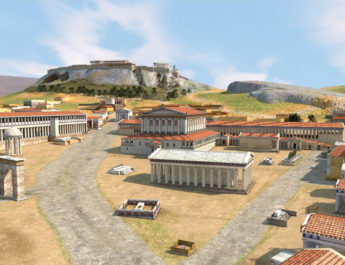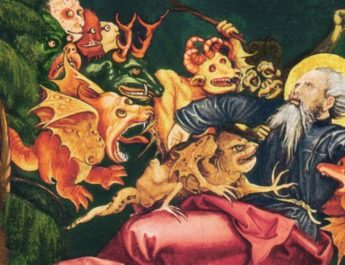John 1:1-18
Narrative Lectionary
1 In the beginningA wasB the Word,C and the Word was with God,D and the Word was God. 2 He was in the beginning with God.
A “beginning” = arche. From archomai (to begin or rule); from archo (to rule, begin, have first rank or have political power). Properly, this is what is first. In a temporal sense, that is beginning or origin. It can also refer to the one who ranks first, i.e. king or ruler. So, it can also be magistrate, power, or principality. It can be used more generally for what is preeminent.
B “was” = eimi. This is to be, exist.
C “Word” = logos. From lego (to speak, tell, mention). This is word, statement, speech, analogy. It is a word that carries an idea or expresses a thought, a saying. It could refer to a person with a message or reasoning laid out in words. By implication, this could be a topic, line of reasoning, or a motive. It can be used for a divine utterance or as Word – Christ.
D “God” = Theos. From Proto-Indo-European origins, meaning do, put, place. This is God or a god in general.
3 All thingsE came into beingF through him, and withoutG him not oneH thing came into being.
E “all things” = pas. This is all or every.
F “came into being” = ginomai. This is to come into being, to happen, become, be born. It can be to emerge from one state or condition to another or is coming into being with the sense of movement or growth.
G “without” = choris. From chora (space, land, region, fields, open area); from chasma (gap, gulf, chasm, open space); from chasko (to gape, yawn). This is apart from, separate from.
H “one” = heis. This is one, a person, only, some.
What has come into being 4 in him was life,I and the life was the lightJ of all people.K
I “life” = zoe. From zao (to live, be alive). This is life including the vitality of humans, plants, and animals – it is life physical and spiritual and life everlasting.
J “light” = phos. From phao (to shine or make visible, especially with rays of light); from the same as phaino (to bring light, cause to appear, shine, become visible or clear). This is light, a source of light, fire, or radiance. This is light with specific reference to what it reveals. It is luminousness whether natural or artificial, abstract or concrete, literal or figurative.
K “people” = anthropos. Probably from aner (man, male, husband) + ops (eye, face); {from optanomai (to appear, be seen); perhaps from horao (become, seem, appear)}. This is human, humankind. Used for all genders.
5 The light shinesL in the darkness,M and the darkness did not overtakeN it.
L “shines” = phaino. Related to “light” in v4. See note J above.
M “darkness” = skotia. 16x in NT. From skotos (darkness literal or figurative – as moral or spiritual darkness, sin and what comes from it; obscurity); from skia (shadow, thick darkness, outline; figurative for a spiritual situation that is good or bad). This is darkness or dimness. Figuratively, it can be a spiritual darkness. This is obscurity in a literal or figurative sense.
N “overtake” = katalambano. 15x in NT. From kata (down, against, among, throughout) + lambano (active acceptance/taking of what is available or what has been offered; emphasizes the choice and action of the individual). This is to take hold of something with great intention for one’s own interest. It can be seize or arrest – grasping forcefully. Figuratively, it can also mean to comprehend, to win, to surprise, or to possess.
6 There wasO a manP sentQ from God
O “was” = ginomai. Same as “came into being” in v3. See note F above.
P “man” = anthropos. Same as “people” in v4. See note K above.
Q “sent” = apostello. From apo (from, away from) + stello (to send, set, arrange, prepare, gather up); {probably from histemi (to make to stand, stand, place, set up, establish, appoint, stand firm, be steadfast)}. This is to send forth, send away, dismiss, send as a messenger. It implies one that is sent for a particular mission or purpose rather than a quick errand. This is where “apostle” comes from.
whose nameR was John.S 7 He cameT as a witnessU
R “name” = onoma. May be from ginosko (know, recognize, learn from firsthand experience). This is a name, authority, cause, character, fame, reputation. The name was thought to include something of the essence of the person so it was not thought to be separate from the person.
S “John” = Ioannes. From Hebrew yochanan (Johanan); from Yehochanan (“the Lord has been gracious”); {from YHVH (proper name of the God of Israel); {from havah (to become); from hayah (to be, exist, happen)} + chanan (beseech, show favor, be gracious; properly, to bend in kindness to someone with less status). This is John, meaning “the Lord has been gracious.”
T “came” = erchomai. This is to come or go.
U “witness” = marturia. From martureo (to bear witness, testify, give evidence; to testify in a literal or figurative sense); from martus (a witness whether having heard or seen something; witness literally, judicially, or figuratively; by analogy, a martyr). This is testimony, witness, evidence, record, reputation.
to testifyV to the light, so that allW might believeX through him. 8 He himself was not the light, but he came to testify to the light.
V “testify” = martureo. Related to “witness” in v7. See note U above.
W “all” = pas. Same as “all things” in 3. See note E above.
X “believe” = pisteuo. From pistis (faith, faithfulness, belief, trust, confidence; to be persuaded or come to trust); from peitho (to have confidence, urge, be persuaded, agree, assure, believe, have confidence, trust). This is to believe, entrust, have faith it, affirm, have confidence in. This is less to do with a series of beliefs or doctrines that one believes and more to do with faithfulness, loyalty, and fidelity. It is trusting and then acting based on that trust.
9 The trueY light, which enlightensZ everyone,AA
Y “true” = alethinos. From alethes (true, unconcealed; true because it is in concert with fact and reality – attested; literally, what cannot be hidden; truth stands up to the test and scrutiny and is undeniable, authentic); {from a (not) + lanthano (concealed, hidden, unnoticed; to shut one’s eyes to, unwittingly, unawares)}. This is literally made of truth – that which is true or real, authentic. Something that is true from its source and has integrity.
Z “enlightens” = photizo. Related to “light” in v4 & “shines” in v5. 11x in NT. From phos (see note J above). This is to shine or give light, illumine or reveal. Properly, it is to enlighten in a literal or figurative sense. It can mean to brighten up or to make one see.
AA “everyone” = pas + anthropos. Literally, “every person.” Pas is the same as “all things” in v3. See note E above. Anthropos is the same as “people” in v4. See note K above.
was comingBB into the world.CC
10 He was in the world, and the world came into being through him, yet the world did not knowDD him.
BB “coming” = erchomai. Same as “came” in v7. See note T above.
CC “world” = kosmos. Perhaps from the base of komizo (to carry, convey, recover); from komeo (to take care of). This is order, the world, the universe, including its inhabitants. Literally, this is something that is ordered so it can refer to all creation. It can also refer to decoration in the sense that something is better ordered and, thus, made more beautiful. This is where “cosmos” and “cosmetics” come from.
DD “know” = ginosko. Related to “name” in v6. See note R above.
11 He cameEE to what was his own,FF and his own peopleGG did not acceptHH him.
EE “came” = erchomai. Same as “came” in v7. See note T above.
FF “own” = idios. This is something that belongs to you or that is personal, private, apart. It indicates a stronger sense of possession than a simple possessive pronoun. This is where “idiot” comes from (denoting someone who hasn’t had formal training or education and so they rely on their own understanding).
GG “own people” = idios. Same as “own” in v11. See note FF above.
HH “accept” = paralambano. Related to “overcome” in v5. From para (beside, by, in the presence of) + lambano (see note N above). This is to receive, take, acknowledge, associate with. It can also mean to take on an office or to learn.
12 But to allII who receivedJJ him, who believed in his name, he gaveKK powerLL to becomeMM childrenNN of God,
II “all” = hosos. From hos (who, which, that). This is how much, as many as, as great as.
JJ “received” = lambano. Related to “overcome” in v5 & “accept” in v11. See note N above.
KK “gave” = didomi. To give, offer, place, bestow, deliver. This is give in a literal or figurative sense.
LL “power” = exousia. Related to “was” in v1. From exesti (to be permitted or lawful); {from ek (out, out of) + eimi (see note B above)}. This is power to act or weight. It especially denotes moral authority or influence. It can mean domain, liberty, freedom, capacity, mastery, right, force, or strength.
MM “become” = ginomai. Same as “came into being” in v3. See note F above.
NN “children” = teknon. From tikto (to beget, bring forth, produce). This is a child, descendant, or inhabitant.
13 who were born,OO not of bloodPP or of the willQQ of the fleshRR or of the will of man,SS but of God.
OO “born” = gennao. Related to “came into being” in v3. From genna (descent, birth); from genos (family, offspring, kin – in a literal or figurative sense); from ginomai (see note F above). This is to beget, give birth to, or bring forth. Properly, it refers to procreation by the father, but was used of the mother by extension. Figuratively, this can mean to regenerate.
PP “blood” = haima. This is blood in a literal sense as bloodshed. Figuratively, it can also be used to refer to wine or to kinship (being related).
QQ “will” = thelema. From thelo (to desire, wise, will, intend). This is the act of will, choice, purpose, or decree.
RR “flesh” = sarx. May be from saroo (to sweep, cleanse by sweeping); from sairo (to brush off). This is flesh, the body, human nature, materiality, kindred. Flesh is not always evil in scripture (as when it refers to Jesus taking on a human body). However, it is generally used in a negative way for actions made selfishly and not through faith. This can mean animal flesh, i.e. meat, or refer to body in contrast to soul/spirit. Flesh can be a way of talking about how things or people are related or talking about human frailty (physical or moral).
SS “man” = aner. Related to “people” in v4. See note K above.
14 And the Word became flesh and livedTT among us, and we have seenUU his glory,VV
TT “lived” = skenoo. 5x in NT– 1x in John 1 & 4x in Revelation. From skenos (tent, tabernacle; used figuratively for the body as the home of the spirit; this is generally a hut or temporary home); from skene (a tent, booth, tabernacle, dwelling – in a literal or figurative sense). This is to encamp, dwell, have or pitch a tent.
UU “seen” = theaomai. From thaomai (to gaze at a spectacle; to look at or contemplate as a spectator; to interpret something in efforts to grasp its significance). This is to behold, look upon, see, contemplate, visit like a spectator. This is the root of the word “theatre.”
VV “glory” = doxa. From dokeo (to have an opinion, seem, appear, suppose; a personal judgment; to think); from dokos (opinion). This is literally something that evokes a good opinion – something that connects to our understanding of intrinsic worth. The ultimate expression of this is, of course, God and God’s manifestation. So, this is opinion, honor, and dignity, but also praise, glory, renown, and worship.
the glory as of a father’sWW only son,XX fullYY of graceZZ and truth.AAA
WW “father’s” = pater. This is father in a literal or figurative sense. Could be elder, senior, ancestor, originator, or patriarch.
XX “only son” = monogenes. Related to “born” in v13 & “came into being” in v3. 9x in NT. From monos (alone, only, solitary, sole, mere, desolate); {probably from meno (to stay, remain, wait, continue, endure)} + genos (see note OO above). This is only begotten, unique, one and only, one of a kind.
YY “full” = pleres. 16x in NT. From pletho (to fill, accomplish, supply; to fill to maximum capacity). This is to be full, complete, abounding in, or occupied with.
ZZ “grace” = charis. From chairo (to rejoice, be glad; used to say hello; properly, delighting in the grace of God or experiencing God’s favor); from char– (to extend favor, lean towards, be inclined to be favorable towards). This is grace, kindness, favor, gratitude, thanks. It is the sense of being inclined to or favorable towards – leaning towards someone to share some good or benefit. This can be literal, figurative, or spiritual. It is grace as abstract concept, manner, or action.
AAA “truth” = aletheia. Related to “true” in v9. From alethes (see note Y above). Truth is literally that which is not or cannot be concealed. This word covers more than the sense of true versus false. It spoke of truth as that which corresponds to reality – reality as opposed to illusion. Thus, it includes, sincerity, straightforwardness, and reality itself.
15 (John testified to him and cried out,BBB, CCC “This was he of whom I said, ‘He who comesDDD afterEEE me ranksFFF ahead of me because he was before me.’”)
BBB “cried out” = krazo. This is to cry out, scream, shriek. It is onomatopoeia for the sound of a raven’s call. Figuratively, this means crying out urgently without intelligible words to express something that is deeply felt.
CCC “{untranslated} = lego. Related to “Word” in v1. See note C above.
DDD “comes” = erchomai. Same as “came” in v7. See note T above.
EEE “after” = opiso. Related to “people” in v4. From the same as opisthen (after, back, from the rear); probably from opis (back); from optanomai (see note K above). This is back, behind, after.
FFF “ranks” = ginomai. Same as “came into being” in v3. See note F above.
16 From his fullnessGGG we have allHHH received, grace upon grace. 17 The lawIII indeed
GGG “fullness” = pleroma. Related to “full” in v14. 18x in NT. From pleroo (to fill, make full or complete; properly, filling something up to the maximum extent or induvial capacity; used figuratively for furnish, influence, satisfy, finish, preach, perfect, and fulfill); from pleres (see note YY above). This is fullness, supply, completion, superabundance, or multitude.
HHH “all” = pas. Same as “all things” in 3. See note E above.
III “law” = nomos. From nemo (to parcel out). Literally, this is that which is assigned. It can be usage, custom, or law. This word can be used for human or divine law. It can be used specifically for the law of Moses or as a name for the Torah (the first five books of the Bible). Sometimes it is used for scripture as a whole, used of the Gospel, or of any theology. It is also used for the “tradition of the elders,” which would be the oral Torah – the tradition of the laws plus their interpretations as they were passed down over time. We must carefully consider which meaning of “law” is meant when we interpret passages the word is found in.
was given through Moses;JJJ grace and truth cameKKK through JesusLLL Christ.MMM
JJJ “Moses” = Mouses. From Hebrew Mosheh (Moses); from mashah (to pull out in a literal or figurative sense, to draw out) OR from Egyptian mes or mesu (child, son i.e. child of…). This is Moses – the one drawn out from the water, which is to say, rescued. If derived from the Egyptian, his name would share a root with Rameses and Thutmose.
KKK “came” = ginomai. Same as “came into being” in v3. See note F above.
LLL “Jesus” = Iesous. Related to “John” in v6. From Hebrew Yehoshua (Joshua, the Lord is salvation); {from YHVH (see note S above) + yasha (to deliver, defend, help, preserve, rescue; properly, to be open, wide or free, which implies being safe. So, in a causative sense, this is to free someone)}. This is Jesus or Joshua in Greek – the Lord saves or the Lord is salvation.
MMM “Christ” = Christos. From chrio (consecrate by anointing with oil; often done for prophets, priests, or kings). Literally, the anointed one, Christ. The Greek word for Messiah.
18 No one has ever seenNNN God. It is the only Son, himself God, who is close to the Father’s heart,OOO who has made him known.PPP
NNN “seen” = horao. Related to “people” in v4 & “after” in v15. See note K above.
OOO “heart” = kolpos. 6x in NT. It is bosom (as in the bosom of Abraham from Like 16:22-23). It is also chest, where their garments would fold over. Reclining in this position connoted intimacy and union.
PPP “made…known” = exegeomai. 6x in NT. From ek (from, from out of) + hegeomai (to think, suppose, have an opinion; to lead the way, what comes in front or first, initial thought, high esteem or authority; one who commands in an official capacity); {from ago (lead, bring, carry, drive, go)}. This is to lead the way, bring forth. Figuratively, it is to unfold or explain something thoroughly to show what is most important. This is where the word “exegesis” comes from.
Image credit: “Lily Resurrection” by Frank Wesley.




